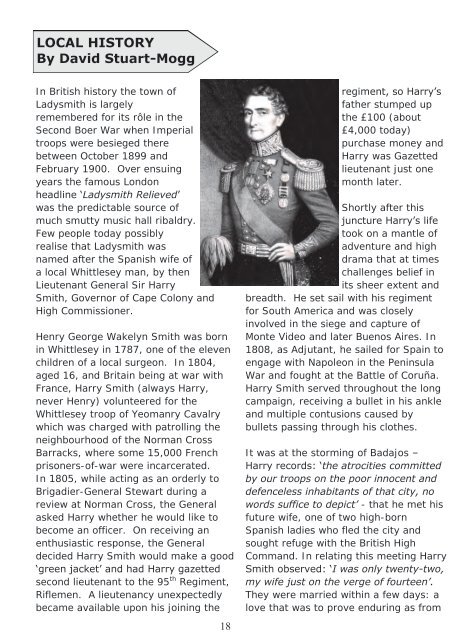September 2012 - Living Villages
September 2012 - Living Villages
September 2012 - Living Villages
You also want an ePaper? Increase the reach of your titles
YUMPU automatically turns print PDFs into web optimized ePapers that Google loves.
LOCAL HISTORY<br />
By David Stuart-Mogg<br />
In British history the town of<br />
Ladysmith is largely<br />
remembered for its rôle in the<br />
Second Boer War when Imperial<br />
troops were besieged there<br />
between October 1899 and<br />
February 1900. Over ensuing<br />
years the famous London<br />
headline ‘Ladysmith Relieved’<br />
was the predictable source of<br />
much smutty music hall ribaldry.<br />
Few people today possibly<br />
realise that Ladysmith was<br />
named after the Spanish wife of<br />
a local Whittlesey man, by then<br />
Lieutenant General Sir Harry<br />
Smith, Governor of Cape Colony and<br />
High Commissioner.<br />
Henry George Wakelyn Smith was born<br />
in Whittlesey in 1787, one of the eleven<br />
children of a local surgeon. In 1804,<br />
aged 16, and Britain being at war with<br />
France, Harry Smith (always Harry,<br />
never Henry) volunteered for the<br />
Whittlesey troop of Yeomanry Cavalry<br />
which was charged with patrolling the<br />
neighbourhood of the Norman Cross<br />
Barracks, where some 15,000 French<br />
prisoners-of-war were incarcerated.<br />
In 1805, while acting as an orderly to<br />
Brigadier-General Stewart during a<br />
review at Norman Cross, the General<br />
asked Harry whether he would like to<br />
become an officer. On receiving an<br />
enthusiastic response, the General<br />
decided Harry Smith would make a good<br />
‘green jacket’ and had Harry gazetted<br />
second lieutenant to the 95 th Regiment,<br />
Riflemen. A lieutenancy unexpectedly<br />
became available upon his joining the<br />
18<br />
regiment, so Harry’s<br />
father stumped up<br />
the £100 (about<br />
£4,000 today)<br />
purchase money and<br />
Harry was Gazetted<br />
lieutenant just one<br />
month later.<br />
Shortly after this<br />
juncture Harry’s life<br />
took on a mantle of<br />
adventure and high<br />
drama that at times<br />
challenges belief in<br />
its sheer extent and<br />
breadth. He set sail with his regiment<br />
for South America and was closely<br />
involved in the siege and capture of<br />
Monte Video and later Buenos Aires. In<br />
1808, as Adjutant, he sailed for Spain to<br />
engage with Napoleon in the Peninsula<br />
War and fought at the Battle of Coruña.<br />
Harry Smith served throughout the long<br />
campaign, receiving a bullet in his ankle<br />
and multiple contusions caused by<br />
bullets passing through his clothes.<br />
It was at the storming of Badajos –<br />
Harry records: ‘the atrocities committed<br />
by our troops on the poor innocent and<br />
defenceless inhabitants of that city, no<br />
words suffice to depict’ - that he met his<br />
future wife, one of two high-born<br />
Spanish ladies who fled the city and<br />
sought refuge with the British High<br />
Command. In relating this meeting Harry<br />
Smith observed: ‘I was only twenty-two,<br />
my wife just on the verge of fourteen’.<br />
They were married within a few days: a<br />
love that was to prove enduring as from


